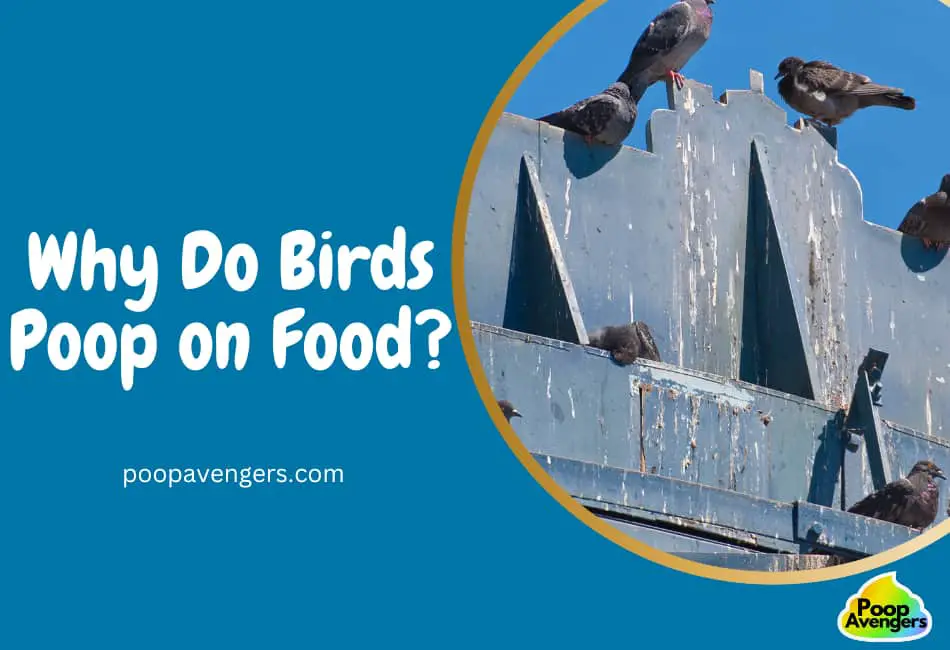You’re enjoying a lovely outdoor picnic, and just as you’re about to dig into your meal, you notice a bird has left an unwelcome surprise on your food.
It’s a scenario that many of us have experienced, leaving us wondering why birds seem to target our meals with their droppings.
In this blog post, we will investigate the fascinating world of bird behavior to uncover the reasons behind this all-too-common occurrence.
We’ll examine factors such as their unique digestive systems, territorial marking instincts, and scavenging habits, all of which contribute to birds’ propensity for pooping on food.
As we explore these captivating aspects of avian life, we’ll also offer practical tips to help you safeguard your food from unwanted droppings, fostering a more peaceful coexistence with our feathered friends.
Understanding the Behavior
To comprehend why birds poop on food, it’s essential to understand their digestive systems and natural behaviors.
Let’s take a closer look at these aspects to gain a better understanding of what drives birds to defecate on food sources.
Explanation of Bird Digestion
Birds have a unique digestive system that differs from mammals. Their gastrointestinal tract is designed for rapid digestion, allowing them to process food quickly and efficiently.
Unlike mammals, birds do not have separate exit points for urine and feces. Instead, they excrete both solid waste (feces) and liquid waste (uric acid) simultaneously through a single opening called the cloaca.
This efficient digestive process means that birds produce waste more frequently than mammals, which increases the likelihood of droppings landing on various surfaces, including food.
Natural Behavior
Birds are naturally inclined to keep their nests clean and free of waste to prevent the spread of disease and parasites. To achieve this, they often defecate away from their nesting areas.
When perching on branches or other structures, birds may release droppings without any specific target in mind. If food happens to be below their perch, it may inadvertently become a landing spot for their waste.
Instinctive Marking Behavior
Another factor that contributes to birds pooping on food is their instinctive marking behavior. Birds, like many animals, use their waste as a means of marking their territory.
This behavior helps establish boundaries and communicates their presence to other birds within the area.
By defecating on or near food sources, birds are essentially signaling that the area belongs to them and other birds should stay away.
Reasons for Birds Pooping on Food
There are several reasons why birds may choose to defecate on food, ranging from accidental occurrences to deliberate actions driven by instincts and survival strategies.
Let’s explore these reasons in more detail.
1. Scavenging Behavior
Many bird species are natural scavengers, always on the lookout for their next meal. They may come across unattended human food sources such as picnics, outdoor dining areas, or garbage cans as they search for food.
While feeding, birds might accidentally defecate on the food they are consuming, especially since their rapid digestion means they excrete waste frequently.
2. Communication and Dominance
Birds are highly social creatures; within their flocks, they often establish hierarchies based on dominance.
Defecation can serve as a form of communication among birds, helping them assert their position within the flock.
By pooping on a food source, a dominant bird may be sending a message to other birds that it has claimed the food and that they should not attempt to eat it.
3. Nest Defense
Another reason birds might poop on food is to protect their nests from potential threats. By defecating on food sources near their nesting area, birds create an unpleasant environment that deters other animals from approaching.
This tactic helps safeguard their eggs and young from predators or competitors seeking to steal their resources.
4. Inadvertent targeting
In some cases, birds may not intentionally target food with their droppings but simply happen to release waste while flying over or perching near the food.
Since birds cannot control the exact timing and location of their bowel movements, it’s possible that food contamination is purely coincidental rather than a deliberate action.
Understanding the reasons behind birds pooping on food helps us appreciate the complexity and diversity of avian behavior, as well as recognize the importance of protecting our food from contamination.
Preventive Measures
To minimize the likelihood of birds pooping on your food, it’s essential to take preventive measures that either deter birds from approaching or protect your food from contamination. Here are some practical tips and strategies to help you keep your meals bird-dropping-free.
Food storage and protection
Proper food storage is crucial in preventing birds from accessing your meal. Store food in airtight containers or cover it with a mesh food cover to keep birds at bay when dining outdoors.
If possible, avoid leaving food unattended, as this can quickly attract birds and other opportunistic animals.
Physical Deterrents
Using physical barriers or devices can be an effective way to deter birds from landing on or near your food. Some options include:
- Bird spikes: Placing bird spikes on surfaces where birds might perch can discourage them from landing nearby and defecating on your food.
- Bird netting: Installing bird netting around outdoor dining areas can help keep birds away from your food.
- Decoys: Placing realistic-looking decoys of predatory birds, such as owls or hawks, can scare off smaller birds and prevent them from approaching your meal.
Behavior Modification
Another approach to preventing birds from pooping on food is to modify their behavior by making the area less appealing or comfortable for them. Some techniques you can try include:
- Noise-making devices: Using devices that emit sounds that birds find unpleasant or frightening can help deter them from the area. Examples include ultrasonic bird repellers or recordings of distress calls from their own species.
- Visual deterrents: Reflective tape, shiny balloons, or other visual deterrents can disorient or scare away birds, keeping them away from your food.
- Habitat modification: Altering the environment around your outdoor dining area can make it less attractive to birds. For example, remove bird feeders, trim overgrown trees and bushes, or eliminate standing water sources to discourage birds from congregating nearby.
By implementing these preventive measures, you can significantly reduce the likelihood of birds pooping on your food, allowing you to enjoy your meals without worrying about contamination.
Conclusion
Throughout this blog post, we have explored the fascinating world of bird behavior to understand why birds sometimes poop on food.
By examining their unique digestive systems, natural instincts, and various factors that influence their actions, we can better appreciate the complexity of avian life and recognize the importance of protecting our food from contamination.
To recap, some of the primary reasons for birds pooping on food include scavenging behavior, communication and dominance, nest defense, attraction to colors and shiny objects, mistaking food for a suitable perching spot, stress or fear response, mating and courtship behavior, and inadvertent targeting.
Various factors, such as bird species, diet, environmental factors, and human influence, can also affect this behavior.
Preventive measures like proper food storage, the use of physical deterrents, and behavior modification techniques can help minimize the likelihood of birds defecating on food.
These strategies allow us to enjoy our meals outdoors without compromising food hygiene.
In closing, it’s essential to appreciate the beauty and diversity of birds while finding ways to coexist peacefully with them.
Understanding their behavior and taking appropriate precautions can help us maintain a harmonious relationship with our feathered friends, ensuring that both humans and birds can thrive in shared environments.

